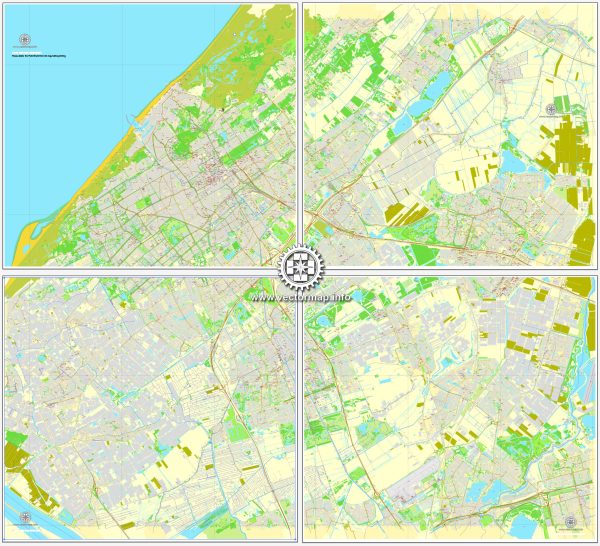The urban development of The Hague (Den Haag in Dutch), Netherlands, is characterized by a blend of historic charm and modern functionality. As one of the most prominent cities in the Netherlands, The Hague serves as the country’s political and administrative center. Here is an overview of its urban development:
- Historical Architecture: The city is known for its well-preserved historical architecture. The Binnenhof, a complex of government buildings dating back to the 13th century, is at the heart of the city. The Ridderzaal (Knight’s Hall) within the Binnenhof is particularly iconic.
- Mixture of Old and New: The Hague has managed to integrate modern architecture with its historical surroundings. In areas like the Scheveningen beachfront, you can find contemporary buildings, hotels, and cultural centers.
- Green Spaces: The city is rich in green spaces, such as the beautiful Haagse Bos (The Hague Forest) and Westbroekpark. These areas provide residents and visitors with recreational spaces in the midst of the urban environment.
- International Organizations: The Hague is home to numerous international organizations and embassies, including the International Court of Justice and the International Criminal Court. This has led to a unique, cosmopolitan atmosphere.
- Infrastructure: The city has a well-developed public transportation system, including trams and buses, which facilitate easy movement around the city. There’s also a central train station connecting The Hague to other major cities in the Netherlands.
- Cultural and Educational Institutions: The city boasts a vibrant cultural scene, with numerous museums and theaters. The Royal Palace and Mauritshuis are notable cultural landmarks. The presence of educational institutions like Leiden University Campus The Hague contributes to its intellectual vitality.
- Economic Hub: The Hague is not only a political and administrative center but also a significant economic hub. The city’s economy is diverse, with a focus on sectors like legal services, finance, and technology.
- Residential Areas: The city offers a range of residential neighborhoods, from historic areas with charming townhouses to modern high-rise apartments. Scheveningen, a seaside district, is especially popular for its beachfront properties.
- Sustainability Initiatives: Like many European cities, The Hague is making efforts to become more sustainable. These initiatives include improved public transportation, cycling infrastructure, and green building projects.
- Cultural Diversity: The Hague is known for its diverse population, with a significant international community. This diversity is reflected in its cuisine, events, and cultural festivals.
Overall, The Hague’s urban development is a harmonious blend of tradition and modernity, offering a high quality of life for its residents and making it an attractive destination for tourists and international organizations.


 Author: Kirill Shrayber, Ph.D. FRGS
Author: Kirill Shrayber, Ph.D. FRGS